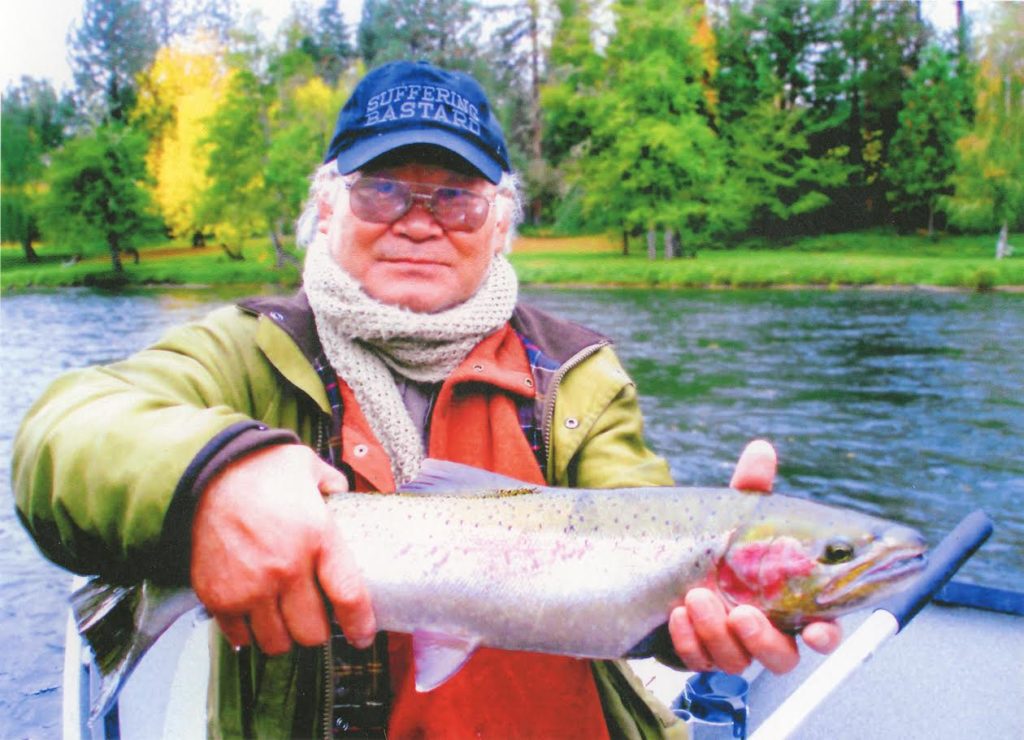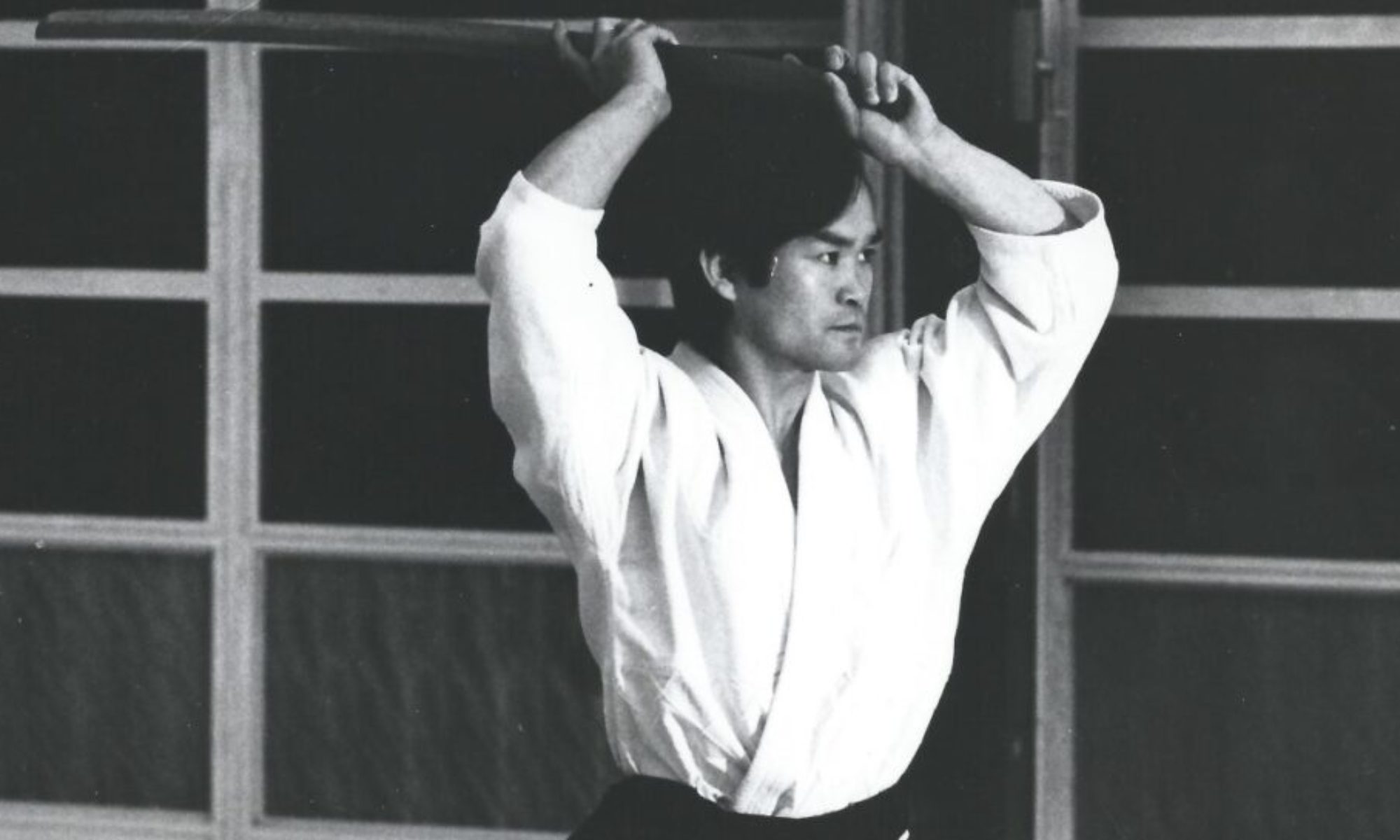T.K. Chiba Shihan, Birankai Founder

We did ikkyo, shihonage, kotegaishi to confirm the importance of basics. You know training can be kind of boring – year after year the same thing, over and over. That’s what it is – nothing exciting… it’s just like a meal you eat every night, night after night. If it’s something very exciting you get sick. A healthy meal is sort of a boring meal – no excitement…
All of Aikido is to work with your body. The body is the foundation for everything. Work with your body…
Of course, Aikido is not limited to a mat space like this. There is a huge world out there, what I call big Aikido or big dojo. Practice Aikido principles within the big Aikido, right out there! That is what true Aikido is.
T.K. Chiba, from Oct 2, 1998 lecture at Siskiyou Aikikai, Ashland, Oregon
The atmosphere of our contemporary lifestyle surrounds us with a multitude of tools and equipment, an unprecedented variety of conveniences. Yet the complaint is often that it is difficult to find a place where one can study or acquire competence in some discipline. All that a person needs is “a sincere willingness to study.” If one truly wishes to study, one can do so under any circumstance.
Shozo Sato, From Shodo: The Quiet Art of Japanese Calligraphy
Chiba Sensei’s essay from the 1998 Summer Edition of Sansho, entitled “Food and Diet” is both philosophical, noting the body and earth are inseparable, and practical, as Sensei offers clear guidelines to eat a healthy diet which sustains us in our practice.
In this unprecedented time, facing the challenges of a global pandemic, with our normal rhythms disrupted, attending to what, when and how we eat is especially important. We are all faced with how to maintain our practice, outside our dojos and without (physical) contact with our training partners. If, as Sensei says, working with our body is the foundation of our training, and as Shozo Sato reminds us, “A willing heart is the dojo”, we can use this time – wherever we are – to grow our practice. Refining our diet can therefore be an important element in our personal study during this predicament.
Many of us who practiced with Chiba Sensei directly received his instruction on diet – recommendations which closely resemble those of writers Michael Pollan, Mark Bittman, Alice Waters and many others. In his book Food Rules, Pollan sums up his dietary advice in seven words: “Eat food, not too much, mostly plants.” Pollan elaborates his first rule with, “Don’t eat anything your great grandmother wouldn’t recognize as food”. As you will read, Sensei would offer, “Eat food, as whole as possible, from what is seasonally available where you live”.
Sensei’s quote above observes how our approach to training and to eating can be similar: with an attitude of reverence and adherence to basics, without too much attachment to what’s exciting. As part of our series on becoming more antifragile, I hope Chiba Sensei’s reflections encourage you to practice big Aikido, to seize opportunities for growth where you can, even at places like your dining table.
– Darrell Bluhm Shihan, Ashland, Oregon 1 May 2020
My basic philosophy of Diet is “Shin Do Fu Ji: Body and earth are inseparable.” Shin (body), means the physical body and presence, the “being.” Do (earth) is the multitude of conditions that comprise the “being,” including the environment, locality, and seasons. Fu Ji (inseparable), means that body and earth are one. This philosophy corresponds to the concept of the circulation of energy: Human beings absorb energy from other entities through eating, and create new entities with the energy we take in. This view also parallels the Buddhist concept of reincarnation — the foundation of the Buddhist view of the cosmos.
All life forms depend on the presence of other life forms. We exist in a continuously flowing cycle of life in which we eat other life forms, absorb their energy as a source of our life force and create other life forms with the energy we have absorbed. The reincarnation theory of Buddhism is not only an abstract concept of rebirth to another life, but also a reality happening before our very eyes. We must recognize the fact that all the life forms we consume are a necessary sacrifice to maintain our lives. This recognition is fundamental and is the wellspring of reverence toward life. Through it, we gain awareness of the importance of self-sacrifice in our own lives as well.
To restate this philosophy as a simple universal law applicable to all life forms: “Respect others!” Reverence toward life can be manifested through three principles of recognition: (1) Know what is enough. (2) Do not waste. (3) Do not devour. These are the principles of eating. These three principles point to one central theme: We should sacrifice more than what we need in the universal flow of life.
These principles of recognition lead us to the importance of mindful chewing when we eat. Chewing well is important because of the physiological necessity of absorbing nutrition, but it is also significant because it creates a quiet dialogue with the life forms being sacrificed. Through this dialogue we unite with other life forms. Only then are we able truly to taste the essence of the sacrificed life forms.
The Eastern and Western views on this subject are quite different. Christianity teaches us that God and human beings are in separate domains, and that humans and other life forms are also in separate domains. It teaches us that other life forms are created for humankind. This is a very “human centered” view of the universe.
Buddha taught that “Weeds, trees, the earth and all creation can have Buddha’s nature.” In this view, not only human beings, but also weeds, trees, earth and rubble may have Buddha’s nature!
Similarly, Shinto religion teaches us that there are eight million gods in the universe. This means that from a Shinto perspective, we see gods within all life forms as well as in natural phenomena. In Buddhism and Shinto, humans are not above all other creatures, and therefore cannot do whatever they wish to other life forms.
Now let’s return to my basic theme, the “Shin Do Fu Ji” philosophy. First of all, the actual practice of the philosophy — in other words, the fundamentals of diet– should be based on the earth. This means that the food you consume should be based on the life forms indigenous to your locale, i.e., life forms which grow in the same environment in which you live. Moreover, you should eat food in season (spring, summer, fall, winter). The advancement of refrigeration technology and worldwide transportation allows us to eat anything at any time. Without being conscious of it, we eat foods from all over the world, even if they are not in season locally. In this day of modern convenience, we need to pay particular attention to the food we consume.
Second, you must eat food which is as close to its original form as possible. Thus, when you eat rice, eat genmai (brown rice). When you eat wheat, eat unprocessed flour. When you eat fish, eat it whole, as much as possible. Small fish should be eaten as they are (head and all). Large ones can be cooked with skin and bones intact. If you eat vegetables, eat roots, leaves, stems and flowers. In short, you should basically eat foods which are processed to the least extent possible.
Third, eat foods that still have life (ki) in them. The question you should ask is whether what you are about to eat will grow if you plant it in the earth. Is it alive? (Does it have ki?) Eat food that is as close to this state as possible. Examples of these foods are root vegetables, beans, unrefined grains, seaweed and seeds. They are closest to the ideal foods. In the case of fish, the basic method of cooking should be cooking whole (head, skin, flesh and bones). Dried or smoked fish, deep fried fish, small fish tempura, etc., are ideal methods of fish preparation.
You should be careful about meat, however. Meat can be appropriate for people in cold climates. On the other hand, we Japanese have been vegetarians for a long time and have a rather short history with the practice of eating meat. Consumption of a large quantity of meant has physiologically harmful effects on us. We have a longer small intestine than Europeans (because we were traditionally vegetarians). Therefore meat remains in our bodies longer, and the decaying meat acidifies our blood.
When you eat meat, also eat colorful vegetables, potatoes, and drink red wine to balance the meat’s extreme acidity. Most meat in today’s marketplace is artificially raised. Thus, most chickens are diabetic because they are crammed in a small area without freedom of movement and fed high calorie feeds and antibiotics. When it comes to fish, yellowtail tuna, which most Japanese love to eat, tastes completely different when naturally caught in the ocean than it does when farmed. If you must eat meat, to the greatest extent possible select kinds that are raised in a natural environment. Lamb is close to the ideal meat in this sense.

The reason why I fish so frequently is that I don’t trust the fish that are available in markets today. Prepared filets can be washed too much, to the point where nutrients have been washed off the meat. Also, they are no longer a totally balanced food since they are missing heads, bones and skin. They have no power to harmonize.
The importance of diet is that it is the foundation of the creative development of life and living. We must not neglect what kind of food we consume. The conscious choice of diet is also a concrete way to recognize and feel one’s participation in the law of universal nature.
It is important to understand that each individual must choose his or her best diet with comprehensive study and actual experience, based on the customs, seasons and climate of the area where he or she lives, his or her profession, individual body constitution and characteristics, family environment, etc.
Take, for example, a man who has physical flexibility but who lacks muscle and body strength. If I describe flexibility versus strength as negative (-) versus positive (+), he is too much on the negative (-) side. In order to regain the ideal balance in his body, he must include the following items in his diet: high quality protein (grains, beans, naturally raised meat or fish), a variety of vegetables (burdock, carrots, radish, turnips, yams, onions, potatoes, etc.), and all kinds of seaweed. They are positive (+) yang foods. Consumption of these sorts of foods will offset his strong (-) tendency. In addition, he should include high quality vegetable oils and salt, such as sesame oil and natural vegetable oil and neutralized salts such as sesame salt, miso (soy bean paste) and umeboshi (pickled plum). These are (+) foods. Even if he doesn’t like fish bones, smelt and smoked whitefish — when broiled well — are good companions to beer. Ancient Japanese wisdom created miso soup with dried small fish in the soup stock.
It is a well known fact that during the Russo-Japanese and Sino-Japanese wars, Japanese soldiers’ body strength (stamina) was number one in the world — even though, based on European standards of nutrition, it should have been among the worst because of their “poor” diet, from a European point of view. Nowadays the simple traditional Japanese diet is being reevaluated in light of contemporary nutritional excesses.
As I mentioned above, diet is the foundation of life activities. At the same time, as we are social animals (beings), it is the foundation of harmony among people. The consumption of food should have a social aspect to it. Excessive insistence on a certain kind of diet may disrupt harmony in groups and within your family. In your association with food you must keep flexibility in mind during those times when you are the host who provides food for others, as well as during those times when you are the guest who is treated to a meal. It takes great internal strength to practice this middle-of-the-road lifestyle. It is a difficult road to travel — that of clearly knowing the foundation of your own diet while having a sense of balance and understanding of how to harmonize with other people in society. My own motto is: “Harmonize yet do not get swept away.”
Recipes-Heins**Editor’s note: when purchasing books or other items online, please consider using Amazon Smile, designating “Birankai International” to receive donations generated from your purchases.
